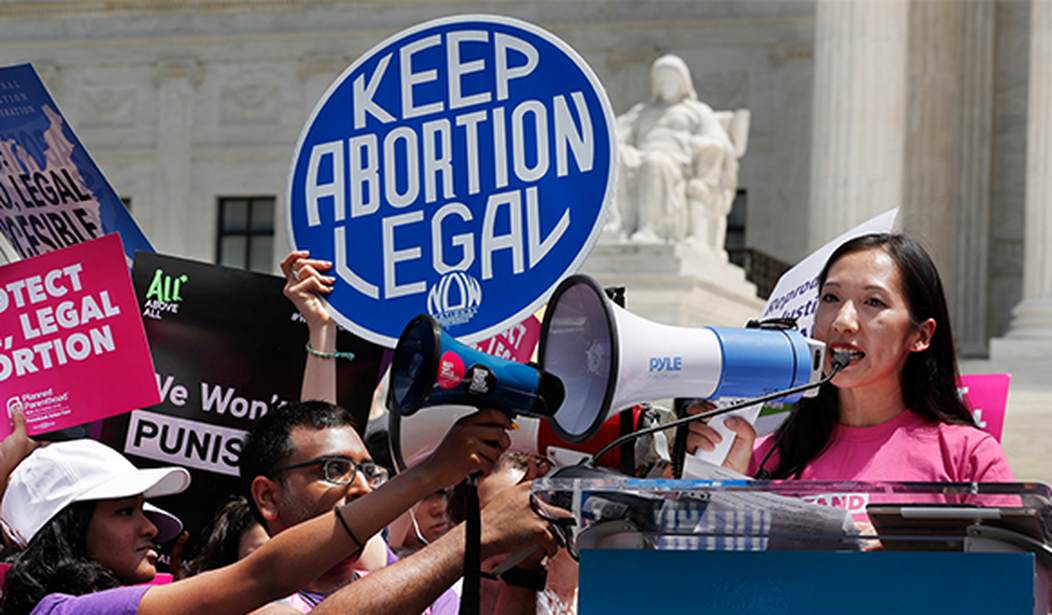Politics is downstream of culture. The only group that knew that better than Andrew Breitbart was the leftist propaganda machine and they’ve been using the entertainment industry to push society toward their way of thinking, inch by inch.
To be sure, they’ve been mighty successful. Even from the days of the Dick Van Dyke Show you’ve seen bits and pieces of progressive politics bleeding its way into society, altering the way we view the world as we’re being amused and entertained.
Now we have mainstream publications promoting the idea that the entertainment industry take things way too far and begin normalizing abortions in our society by showing characters in media do them on screen.
Marie Claire released a piece by Danielle Campoamor who argued that having characters do it on screen would effectively destigmatize abortion and convince more people to go through with them:
Countless studies have highlighted the importance of representation in the media, be it race, gender, relationships, body size and shape, mental health, or disability status. The same is true of abortion—a safe medical procedure one in four women (as well as trans men and non-binary people) will have by the time they’re 45. But accurate depictions of the most common abortion patients, parents, is still severely lacking—to the detriment of mothers like Winston and the abortion providers who care for them.
The article continues with Campoamor pining over the days when we were apparently showing far more of them on screen than we do today and that when it is shown, it’s always accompanied by women wrestling with the emotional turmoil of doing it than projecting them as having zero problems with it at all.
When we read articles like these we tend to laugh them off and call the people who suggest these ideas ridiculous, but we shouldn’t be so ready to dismiss them. This idea may seem fringe now, but it might not be sooner than you think.
Take, for instance, the time Salon published an article effectively defending pedophilia. The article was eventually deleted, but not long after, the BBC itself picked up the baton and attempted to paint pedophiles more sympathetically. Salon was considered a hard-left haven, and the insanity could be relegated to someone’s ideological makeup. The BBC, however, is mainstream.
Now imagine this mainstream paper convinced mainstream artists to create shows or movies that attempted to normalize adult/child relationships. It wouldn’t immediately dive in to the idea that adults should be able to touch young children, it’d gradually work its way there by perhaps first starting at young teenagers.
And that’s already happened as well with 2017’s “Call Me by Your Name” which features a sexually charged relationship between a 25-year-old man and a 17-year-old boy.
If Hollywood is well on its way to normalizing pedophilia, abortion won’t be a problem.
The trick is getting people to empathize with characters in the midst of these situations so that they can better put themselves into their shoes and adopt their way of thinking. According to a Harvard study, empathy is a very effective tool at getting you to loosen your morals:
-
The empathy machine: We know that putting ourselves in other people’s shoes is essential to building the bonds of empathy that are foundational to a healthy, pluralistic society. It is possible the most important way entertainment influences public opinion is by exposing individuals to a greater diversity of people and ideas than one could ever experience directly, and that such exposure serves to expand the range of people and ideas that are included in our normative view of society.
-
Belonging and opportunity: Whereas the empathy machine hypothesis is about how I see other people, it is possible that entertainment also influences how I see myself. One could imagine that the more I see people like me in the stories we choose to tell, the more likely I would be to feel a sense of dignity, pride, and belonging in society. Moreover, those stories may reveal life opportunities that I didn’t know existed, and therefore expand the range of possibilities that I perceive as open to me.
-
Perceived majority: Research suggests that entertainment shapes our view about how many people share our beliefs and values. The more particular values or ideas are represented in entertainment, the more we are likely to believe that they are widely shared by the majority in society, regardless of whether this is true. In other words, entertainment shapes what we think most people believe, even if we do not share that belief. This is important because our prior research has found many areas in society (e.g., education, views of success, immigration, criminal justice) today where there is a clear majority that privately holds one view, but these same people incorrectly believe that they are a small minority in the country, and that most people in society are against them.
-
Changing beliefs: Entertainment may also directly shape an individual’s personal opinion on a given subject. This would be the most profound possibility, for better or worse, in the sense that it would mean that rather than being a force for expanding, moderating, or augmenting existing beliefs, entertainment is better understood as a driving force for establishing or changing our core beliefs, values, and preferences.
In short, if the left really wanted you to be okay with abortion, they could begin introducing the idea into storylines in television programs, movies, video games, comic books, and more. If you don’t already hold a firm pro-life belief, you may be tempted to view abortion as an everyday thing that everyone does.
This Marie Claire article is just an article now, but be vigilant. It might become something far more very shortly.














